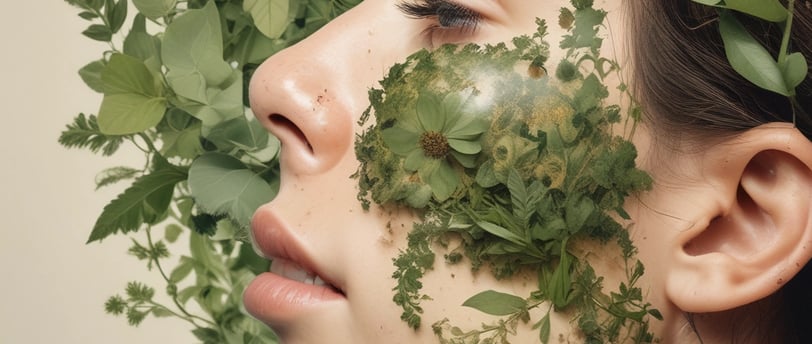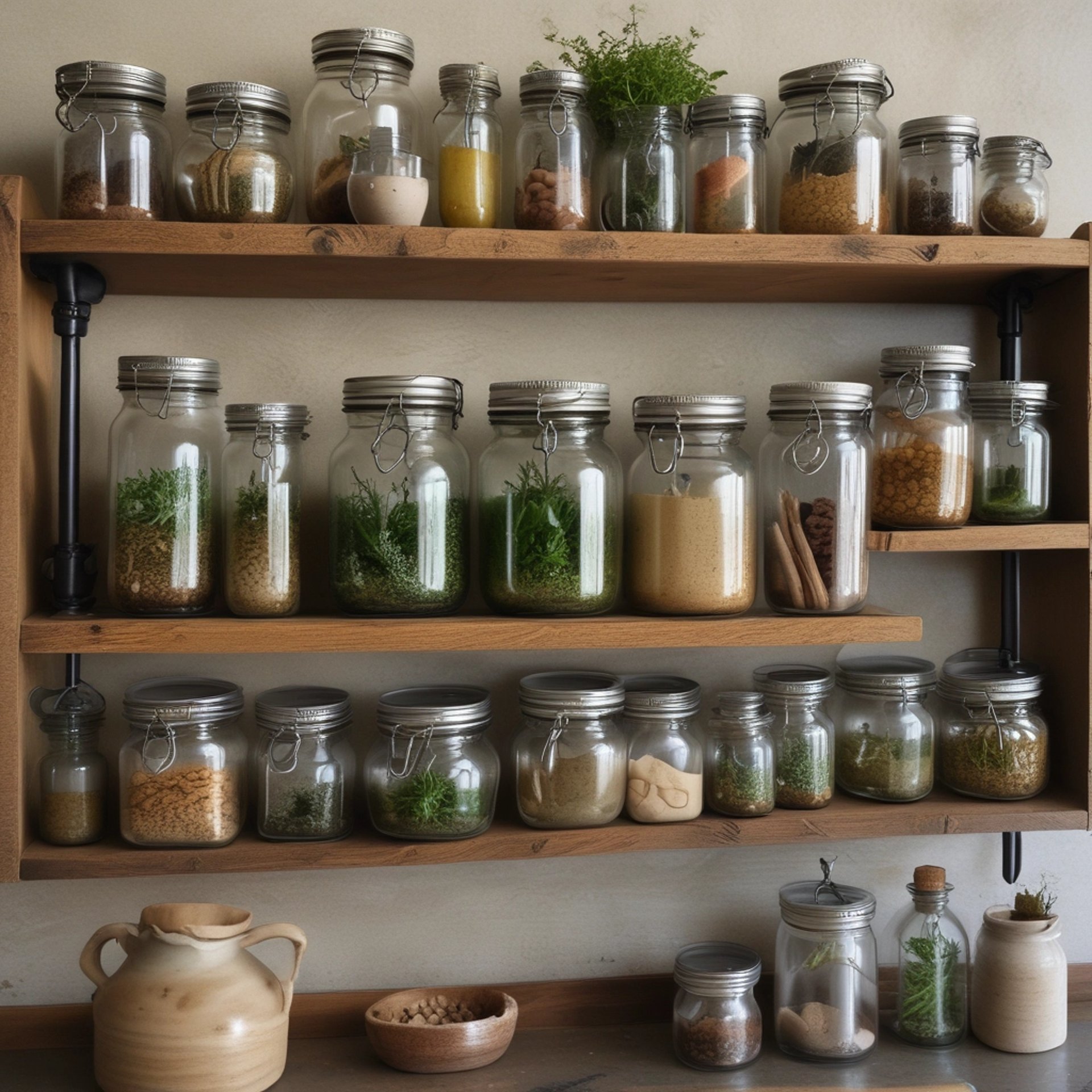Harnessing Nature: Medicinal Herbs for Effective Acne Treatment from Your Backyard
4/1/20259 min read


Introduction to Acne and Its Causes
Acne is a common skin condition that affects individuals of various ages, primarily during adolescence, but can persist into adulthood. The condition is characterized by the presence of various lesions, including comedones (blackheads and whiteheads), papules, pustules, and, in more severe cases, cysts. Understanding the types of acne is essential for effective treatment; therefore, individuals may experience different forms ranging from mild to moderate acne, which can manifest differently based on skin type and susceptibility.
Several factors contribute to the development of acne, with hormonal changes being among the most prominent causes. Fluctuations in hormone levels, particularly during puberty, menstruation, or even due to stress, can lead to increased oil production in the skin, effectively creating an environment conducive to acne development. Additionally, dietary choices have emerged as significant contributors; certain foods, particularly those high in sugars and dairy, have been linked to exacerbation of acne in some individuals. It is crucial, therefore, for each person to analyze their dietary habits as part of their overall acne management strategy.
Stress also plays a pivotal role as it can trigger hormonal imbalances that further contribute to skin issues. The skin acts as an external reflection of our internal health, and therefore, heightened levels of stress may increase oil secretion, leading to clogged pores and breakouts. Moreover, individual skin types, such as oily or dry skin, can influence the severity and type of acne that develops. Recognizing one's unique skin condition is integral to devising a personalized treatment approach. Awareness of these underlying factors sets the foundation for exploring natural remedies, such as medicinal herbs, that will be discussed in the subsequent sections.
The Role of Medicinal Herbs in Skincare
Medicinal herbs have long been recognized for their ability to nurture and heal the skin, particularly in the treatment of acne. These natural remedies can provide effective solutions by harnessing their inherent properties to address various aspects of acne. The anti-inflammatory, antibacterial, and astringent characteristics of certain herbs make them valuable assets in combating breakouts and promoting overall skin health.
Aloe vera, for instance, is renowned for its soothing and hydrating qualities. It contains antioxidants, vitamins, and enzymes that not only hydrate the skin but also reduce inflammation. This can be particularly beneficial for acne-prone skin, as it not only helps to heal existing blemishes but also minimizes the likelihood of new ones forming. The gel of the aloe vera plant can be applied directly to the skin, providing instant relief and promoting a more balanced complexion.
Another potent herb in acne treatment is tea tree oil. This essential oil possesses strong antibacterial properties, effectively fighting the bacteria responsible for causing acne. It also serves as a natural astringent, helping to unclog pores and eliminate excess oil. Diluting tea tree oil with a carrier oil before application can enhance its skin-friendliness while maximizing its acne-fighting benefits.
Witch hazel, known for its astringent effects, can be highly effective in reducing inflammation and redness associated with acne. This herb helps tighten pores and reduce excess oil, creating a healthier environment for the skin. Its application can lead to a noticeable improvement in skin clarity and texture over time.
Lastly, chamomile, often celebrated for its calming properties, can also be beneficial in skincare. With its anti-inflammatory effects, chamomile can alleviate irritation and promote healing of the skin. Using chamomile-infused products or teas in skincare routines may enhance overall skin health and offer a gentle remedy for acne.
By incorporating these medicinal herbs into daily skincare routines, individuals suffering from acne can harness the power of nature to achieve clearer, healthier skin. The natural efficacy of these herbs can provide a supportive approach alongside conventional treatments, leading to a more holistic path to skincare.
Growing Medicinal Herbs in Your Backyard
Starting a medicinal herb garden in your backyard can be an enriching experience, not only for your skincare regimen but also for your understanding of natural healing methods. The journey begins with selecting the right herbs, particularly those that are effective in treating acne. Some of the best choices include thyme, rosemary, chamomile, and calendula, each known for their anti-inflammatory and antibacterial properties.
Once you've selected your herbs, understanding the ideal growing conditions is essential. Most medicinal herbs prefer well-drained soil and plenty of sunlight—aim for at least six hours of direct sunlight daily. Choose a location in your yard that receives adequate sunlight or consider using pots if ground space is limited. When planting, ensure that the soil is enriched with organic matter, as this promotes healthy growth and contributes to the potency of the herbs.
To plant your herbs, follow these simple steps: prepare the seedbed by loosening the soil, sow the seeds or plant young seedlings at the appropriate depth—usually about twice the size of the seed. For best results, maintain consistent moisture as the plants establish, but be cautious not to overwater, as this can lead to root rot. Fertilizing every four to six weeks during the growing season can bolster growth, emphasizing the natural nutritional value of the herbs.
Once your herbs reach maturity, it’s time for harvesting. The best method is to pick them in the morning when the oils are most concentrated, avoiding the hottest part of the day. Use sharp scissors or pruning shears to cut the stems, which ensures the plant continues to thrive. For storage, drying the herbs should be done in a shady, well-ventilated area to retain their medicinal properties. By growing and using these herbs, you integrate a natural skincare routine into your everyday life, right from your backyard.
Homemade Acne Remedies Using Backyard Herbs
Acne is a widespread skin condition that often affects individuals at different stages of life. Harnessing the power of medicinal herbs from your backyard can be an effective way to manage and treat acne naturally. Several herbs possess properties that can soothe inflammation, reduce oiliness, and encourage healing. Here are some homemade remedies made from easily accessible herbs.
One popular remedy is a herbal tea using chamomile and green tea. Boil one cup of water, then add one chamomile tea bag and one teaspoon of green tea leaves. Let it steep for 10 minutes. This combination is known for its anti-inflammatory properties, which can help calm irritated skin. Drink this tea daily, or use cooled tea bags as a compress on affected areas for a soothing effect.
For a herbal mask, a blend of honey and fresh mint can work wonders. Take a handful of fresh mint leaves and crush them to release their oils. Mix them with a tablespoon of honey until you have a paste. Apply it to clean skin and leave on for 15 minutes. Mint has antibacterial properties, while honey is a natural moisturizer that helps combat dryness caused by acne treatments.
A simple topical salve can be created using calendula flowers. Infuse dried calendula in olive oil for a couple of weeks, then strain and store the oil in a glass container. To use, apply a small amount of the oil to breakouts two to three times a day. Calendula is known for its healing properties and can help reduce redness and accelerate recovery.
Additionally, dabbing aloe vera gel directly from the leaf onto acne-prone areas can provide relief and hydration. Aloe vera has long been recognized for its soothing and healing abilities, making it an exceptional choice for sensitive or inflamed skin.
By utilizing these remedies, individuals can tailor their acne treatment to their specific skin types. The integration of natural herbs not only enhances one’s skincare regime but also promotes a more holistic approach to managing acne.
Step-by-Step Guide: Facial Treatments at Home
Creating an effective facial treatment routine at home using medicinal herbs can be both rewarding and beneficial for achieving clear skin. The following step-by-step guide outlines a comprehensive regimen that includes cleansing, exfoliating, and targeting acne spots, utilizing the therapeutic properties of natural products.
Begin by selecting an appropriate herbal cleanser that suits your skin type. Herbs like chamomile or calendula can be made into teas and used as gentle cleansers. Brew a cup of herbal tea, allow it to cool, and apply it to your face with a cotton ball or soft cloth. This method not only cleanses the skin but also provides anti-inflammatory benefits, reducing redness and irritation.
After cleansing, the next step involves exfoliating the skin to remove dead skin cells and unclog pores. A scrub made from ground oatmeal mixed with honey and lemon juice serves this purpose effectively. Oatmeal is a natural exfoliant that soothes the skin, while honey and lemon work together to brighten and rejuvenate. Gently massage this mixture onto your face in circular motions for about 5 minutes before rinsing it off with lukewarm water.
Once your face is clean and exfoliated, it's time to treat any specific acne spots. Herbal remedies such as tea tree oil or lavender essential oil can be mixed with a carrier oil for safe application. Use a clean cotton swab to dab the mixture onto the affected areas. These oils possess antibacterial properties that help in reducing acne and preventing future breakouts.
Finally, it is essential to moisturize the skin to ensure it does not become dry. A simple blend of aloe vera gel and your chosen carrier oil can provide hydration while maintaining a balanced skin barrier. Follow this routine two to three times a week to help achieve glowing, perfect skin, embracing the natural approach to acne treatment.
Additional Natural Remedies and Tips for Acne Management
In addition to utilizing homegrown herbs, incorporating a series of natural remedies and lifestyle adjustments can significantly enhance acne management. One of the foundational steps toward healthier skin is to adopt a balanced diet rich in fruits, vegetables, whole grains, and lean proteins. Foods high in antioxidants, omega-3 fatty acids, and essential vitamins can help combat inflammation and support overall skin health. Maintaining a regular intake of hydrating fluids, primarily water, also plays a crucial role in flushing out toxins and keeping the skin adequately hydrated.
Moreover, certain dietary changes can further assist in acne reduction. Limiting the consumption of processed foods, sugary snacks, and dairy products may help in minimizing breakouts for some individuals. Research suggests that high-glycemic foods can exacerbate acne, hence incorporating low-glycemic alternatives may provide beneficial effects. Similarly, ensuring that you consume adequate fiber can help regulate digestion, which is intimately linked to skin health.
Other lifestyle modifications are equally important. For instance, practicing stress management techniques, such as yoga or meditation, can reduce hormonal fluctuations that trigger acne outbreaks. Regular physical activity enhances blood circulation, which in turn can deliver essential nutrients to the skin, promoting a clear complexion. Maintaining a consistent skin care routine that includes gentle exfoliation, proper cleansing, and the use of non-comedogenic moisturizers can also make a significant difference.
For those specifically dealing with back acne, a few targeted strategies can be effective. Keeping the back clean and dry, wearing breathable fabrics, and ensuring that sweat is promptly washed off can prevent clogged pores. Moreover, gentle scrubs made from natural ingredients can help in exfoliating the skin without causing irritation.
Taking a holistic approach, one that combines dietary modifications, lifestyle changes, and the use of medicinal herbs, can greatly enhance acne management and improve overall skin health.
Conclusion: Embracing Natural Healing for Glowy Skin
In the journey toward achieving clear and radiant skin, incorporating medicinal herbs into one's skincare routine presents a viable option that embraces the principles of natural healing. These herbs, often readily available and easy to cultivate in home gardens, offer a multitude of benefits. Their inherent properties can aid in reducing inflammation, combating bacteria, and improving overall skin texture, making them a potent ally against acne. Using nature-based treatments not only addresses the symptoms of acne but also promotes skin health by minimizing the exposure to harsh chemicals found in many commercial products.
Patience and consistency are vital components in any skincare regimen, particularly when utilizing herbal remedies. As the body adapts to these natural treatments, it may take time to observe significant changes. However, fostering this consistent approach can lead to a deeper understanding of one's skin and its unique needs. Moreover, by engaging actively with nature through gardening, individuals can cultivate a sense of responsibility and care for their own skin health. This relationship between cultivating herbs and self-care creates a holistic approach, intertwining the beauty of nature with personal well-being.
Ultimately, the choice to embrace medicinal herbs for acne treatment is not merely about skin clarity; it reflects a broader commitment to living harmoniously with the natural world. By nurturing plants that contribute to skincare, individuals can enhance their connection to nature, fostering mental clarity alongside physical health. As readers embark on this holistic journey, they are encouraged to explore, experiment, and enjoy the therapeutic benefits that herbal treatments can offer for lasting, glowing skin and overall self-improvement.







